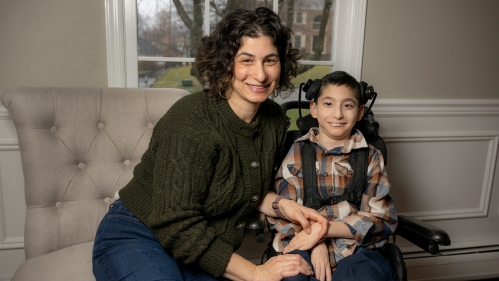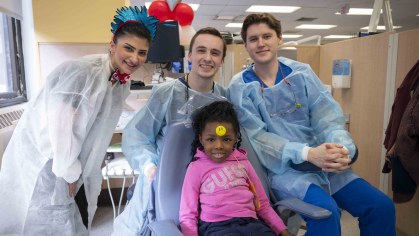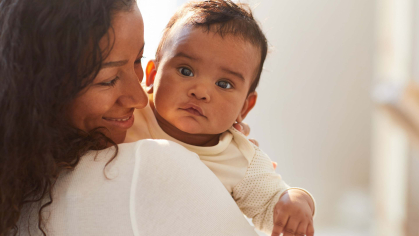Alumna Finds Support Raising Child With Disabilities Through Rutgers

Over 20 years ago, I graduated from Douglass College and Rutgers Business School with a degree in accounting. I learned a lot in my time at Rutgers and, in many ways, was set up for success. But nothing could have prepared me to be a parent, especially a parent of a child with disabilities.
My middle child, Henry, was born early, sick and eventually diagnosed with multiple disabilities due to a virus I caught when I was pregnant. Today, Henry is 11 years old, smart and sweet but dependent for all his care. Finding the best support for him and my family has been difficult.
A friend told me about Partners in Policymaking, which was set up to educate individuals with disabilities as well as parents and caregivers of people with disabilities. The program is offered through the Boggs Center on Developmental Disabilities, part of Rutgers Robert Wood Johnson Medical School. I was amazed to learn my alma mater could help me later in life.
“Partners in Policymaking gives advocates an opportunity to come together, share their lived experience and their vision for the lives of people with disabilities,” Partners participant coordinator Jaime Zahid says.
The program is free and they offer a stipend for childcare, which shows they truly understand the complexity of caring for a child with multiple disabilities. I applied and was thrilled to be accepted.
A group of 25 adults gather twice a month over Zoom and in person to learn from national experts, and each other, about challenges in the community, but also how to brainstorm and effect policy change.
"The program provides participants with the skills and knowledge to work in collaboration with policymakers so they can create meaningful and lasting change for people with disabilities and their families,” says Colleen McLaughlin, associate director of the Boggs Center on Developmental Disabilities.
I shared my new experiences on social media and was excited to learn about friends of mine who graduated from a similar program in their home state.
Initially started by the Minnesota Governor's Council on Developmental Disabilities in 1987, Partners in Policymaking has more than 30,000 graduates across the world. Currently, there is a Partners program in 30 states.
Partners in Policymaking was started in New Jersey in 1996 by the NJ Council on Developmental Disabilities (NJCDD). The Boggs Center began coordinating the program in 2016 through funding from the NJCDD. Since its beginning in 1996, there have been more than 500 Partners graduates across New Jersey.
Through presentations, lectures and hands-on workshops, I learned about the history of disability law. I also learned that many changemakers were disabled themselves or related to people with disabilities.This lesson stoked the fire within me to continue advocating for my son and others like him, especially since I had started a new career as a freelance writer focused on accessibility and inclusion.
“Participants develop the knowledge to advocate for opportunities and supports that promote self-determination, independence, and inclusion in all aspects of community life,” Zahid says. “The graduates gain skills that help them participate on boards and committees, teach peers about best practices, and advocate at the local, state, and federal level.”
One of my co-graduates, Sandy LoPiccolo, whose daughter has autism, made significant changes in her own community. LoPiccolo serves as the board vice chair of the Midland School, a non-profit school in North Branch that provides services to children, teens and adults with intellectual and developmental disabilities.
“Those eight months in the Partners program helped sharpen my focus to support and champion individuals with autism, like her, here in New Jersey,” LoPiccolo says. “Since completing the program, I've joined the Board of Trustees at Autism New Jersey and have become a member of the Parents Council of ACEing Autism."
Another co-graduate, Parul Khemka, ran for the Board of Education in her hometown Livingston just as the program was getting started. “As a parent of a child with profound disabilities, I was eager to learn about the different perspectives that impact policymaking in our state,” says Khemka. “This program helped me bring awareness to my fellow board members and district administration. I hope to continue making an impact at the county, state and national level when I see gaps for our disabled population by educating legislators to make inclusion possible for everyone.”
My class graduated last April and, like my co-graduates, I learned how to find resources for my son and to speak up when I think a policy needs to be changed. These policies impact my son, but they also have an impact on my mental health as his caregiver. I’ve connected with past participants and speakers and interviewed them for articles including one in The New York Times. Just knowing Partners exists, and that they support my family, makes me feel empowered.
“While the members of each graduating class thank us for the amazing opportunity, we are equally grateful for everything we learn from their experiences, ideas and dedication toward helping people with disabilities achieve equity and inclusion,” McLaughlin says. “It's wonderful to see each years’ participants come together, find their people, and work for the greater good."
The next class of New Jersey Partners in Policymaking will be held in 2025-26 with applications accepted in the spring of 2025.



